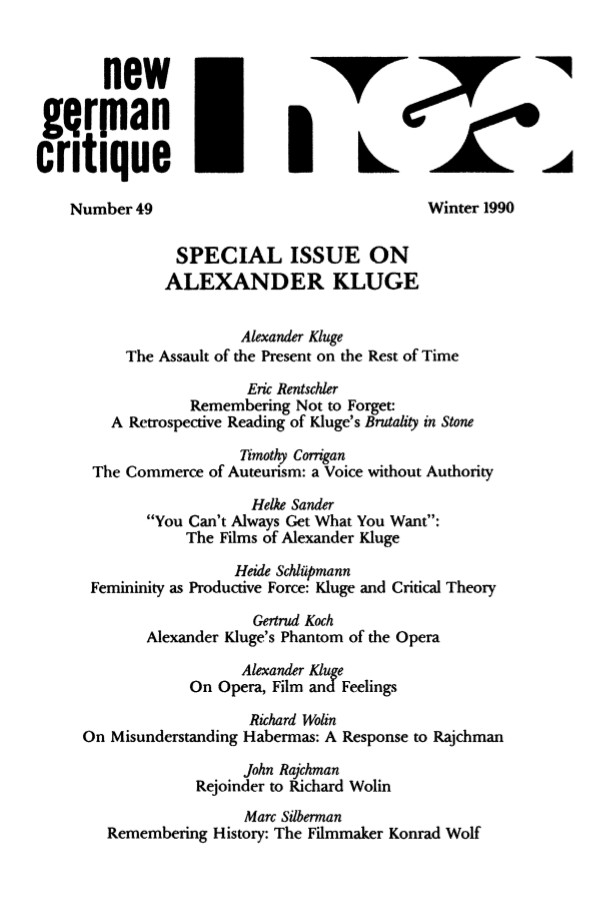New German Critique 49: Special Issue on Alexander Kluge (1990)
Filed under journal | Tags: · cinema, film, film criticism, film theory, politics, television

With texts by Alexander Kluge, Eric Rentschler, Timothy Corrigan, Helke Sander, Heide Schluepmann, Gertrud Koch, Richard Wolin, John Rajchman, and Marc Silberman.
Editors: David Bathrick, Helen Fehervary, Miriam Hansen, Andreas Huyssen, Anson Rabinbach, Jack Zipes
Publisher Telos Press, New York, Winter 1990
196 pages
See also October 46: Alexander Kluge: Theoretical Writings, Stories and an Interview, 1988.
Kluge at Monoskop wiki
Krisis: Journal for Contemporary Philosophy, 3: Civil Disobedience (2012)
Filed under journal | Tags: · activism, disobedience, occupy movement, philosophy, politics, protest, resistance, theory

“Some of the most prominent theories of civil disobedience, e.g. those of Rawls and Habermas, highlight its primarily or even exclusively symbolic character. This, however, seems to reduce civil disobedience to a purely moral appeal. On a theoretical as well as on a practical level we are today faced with the question whether civil disobedience requires a moment of real confrontation for it to be politically effective. It seems that civil disobedience does in fact have an irreducible symbolic dimension, but that it cannot be reduced to this dimension, because without moments of real confrontation it would also lose its symbolic power and turn into a mere appeal to the conscience of the powers that be. The articles in this special section highlight various of the challenges and possibilities the theory and practice of civil disobedience is confronted with today, from the question whether Paraguayan campesinos have a right of necessity also to uncivil actions via the political potential of the apparently criminal behaviour of marginalized migrants and the effects of ‘hermeneutic invisibility’ on the public nature of civil disobedience to the effects rise of ‘art activism’ on the relation between the social and the artistic and the situatedness of the bodies of protesters in relation to changing police tactics.
In ‘The Misadventures of Critical Thinking’ Jacques Rancière explores the anti-emancipatory effect of an artistic and theoretical critique that specializes in unmasking how all attempts at critique are always already anticipated and incorporated by ‘the system’, suggesting that we should instead focus on what he calls ‘scenes of dissensus’. As Joost de Bloois argues in his comment on Rancière’s text, however, this analysis might not only underestimate the complexity of this unmasking critique, it also seems to run into some of the same problems it diagnoses.
In our interview with Wendy Brown we discuss the emancipatory potential as well as the theoretical and political limits of the notions of democracy and communism, the paranoid practice of walling with which states seem to compensate their waning sovereignty, the Occupy movement and the danger of Oedipalization, the varieties of secularism, and the responsibility of teaching.”
Published in Amsterdam, 2012
101 pages
via Jappe Groenendijk
Hamid Dabashi: The Arab Spring: The End of Postcolonialism (2012)
Filed under book | Tags: · arab spring, egypt, geopolitics, iran, islam, libya, marxism, middle east, politics, postcolonialism, revolution, theory

This pioneering explanation of the Arab Spring will define a new era of thinking about the Middle East.
In this landmark book, Hamid Dabashi argues that the revolutionary uprisings that have engulfed multiple countries and political climes from Morocco to Iran and from Syria to Yemen, were driven by a ‘Delayed Defiance’ – a point of rebellion against domestic tyranny and globalized disempowerment alike – that signifies no less than the end of postcolonialism. Sketching a new geography of liberation, Dabashi shows how the Arab Spring has altered the geopolitics of the region so radically that we must begin re-imagining the ‘the Middle East’.
Ultimately, the ‘permanent revolutionary mood’ Dabashi brilliantly explains has the potential to liberate not only those societies already ignited, but many others through a universal geopolitics of hope.
Publisher Zed Books, 2012
ISBN 1780322232, 9781780322230
150 pages
review (Jack Farmer, Socialist Review)
interview with the author (JP O’Malley, OpenDemocracy)

